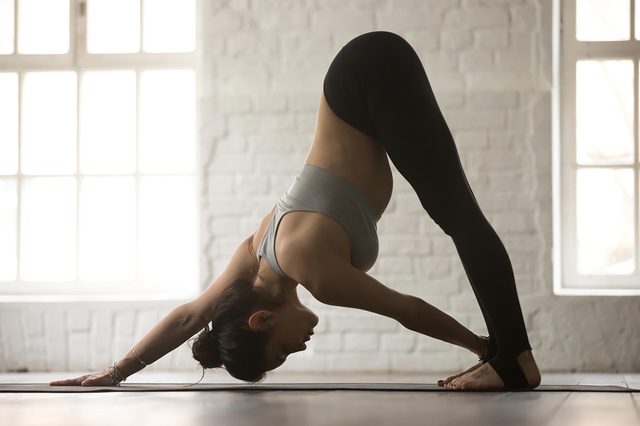
What happens when you stretch your muscles?
You know you should stretch – and you know you feel good when you do it. But what actually happens when you stretch muscles properly?
We spoke with Nikos Apostolopoulos, director of the Microstretching Clinic in Vancouver, on what stretching really means and how to do it right. Start out small, try these easy stretching routines first.

Flexibility is the key to stretch muscles properly
Your flexibility comes from several factors: Joints, ligaments, tendons and muscle.
Some of us, for example, are simply born with looser ligaments and more mobile joints – and that’s not something you want to work on changing, as ligaments connect bone to bone and are important for overall stability in the body.
“If you lengthen your ligaments, you have a problem,” says Apostolopoulos.
The focus in stretching is on the muscle itself and on where the tendons and muscles meet (tendons connect muscle to bone).
“Tendons and muscle seem to be the main structures for flexibility work,” he says. “It’s that interface that’s important.”
As well as joint and ligament structures, your muscle mass (i.e., how strong you are) can affect how far you can stretch, too. “Training really affects flexibility,” Apostolopoulos says.
These yoga inspired stretches will help you get a better night’s sleep.

Focus on your muscles
“Muscle by nature is very pliant,” says Apostolopoulos, adding that muscle can stretch up to one-and-a-half times its own length, while tendons can be damaged permanently being stretched just four percent beyond their length.
When you stretch muscles properly, “it goes from the middle of the muscle belly out to where the muscle and tendon meet.”
In order for the stretch to reach the whole length of the muscle and into the muscle-tendon connections, Apostolopoulos recommends holding each stretch for 60 seconds.
Is it really still necessary to stretch before a workout? Here’s your answer.

Overstretching is a no, no
A gentle stretch relaxes the muscles, letting them release and grow longer. But too intense a stretch can actually create an inflammatory response, Apostolopoulos warns, meaning your body is trying to repair damage.
“Any time you cause pain, you actually cause tissue damage,” he says. “You don’t want to generate any form of pain and discomfort when you are trying to become more mobile and increase your flexibility.”

Relax your mind and body
Stretches should be gentle not only for the sake of the body, says Apostolopoulos, but also for the mind.
“Flexibility work, if done properly, has a calming effect,” he says, adding that for this reason it’s a good thing to practice around bedtime. “A lot of my patients are taught to stretch before they go to sleep.”
Not only does stretching before bed help the mind and body relax, it will help you sleep better, too. “When you prepare your body for sleep through [gently] stretching, you’re helping your body recover and regenerate.”